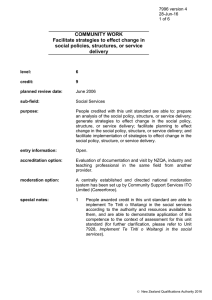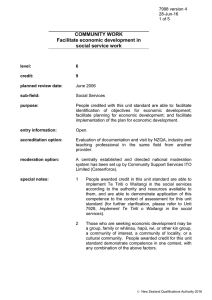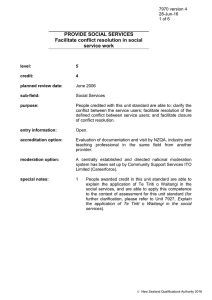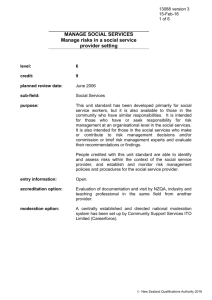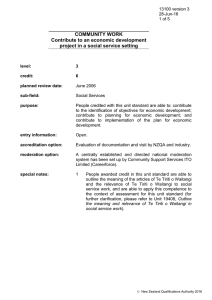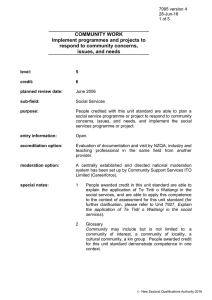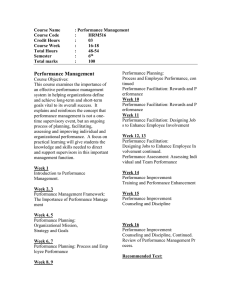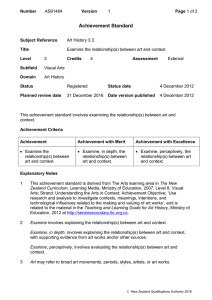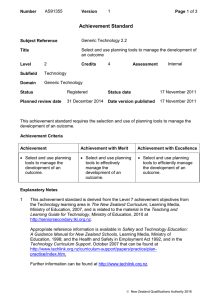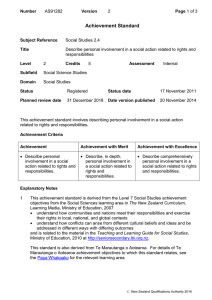COMMUNITY WORK Facilitate strategies to effect community or social change
advertisement
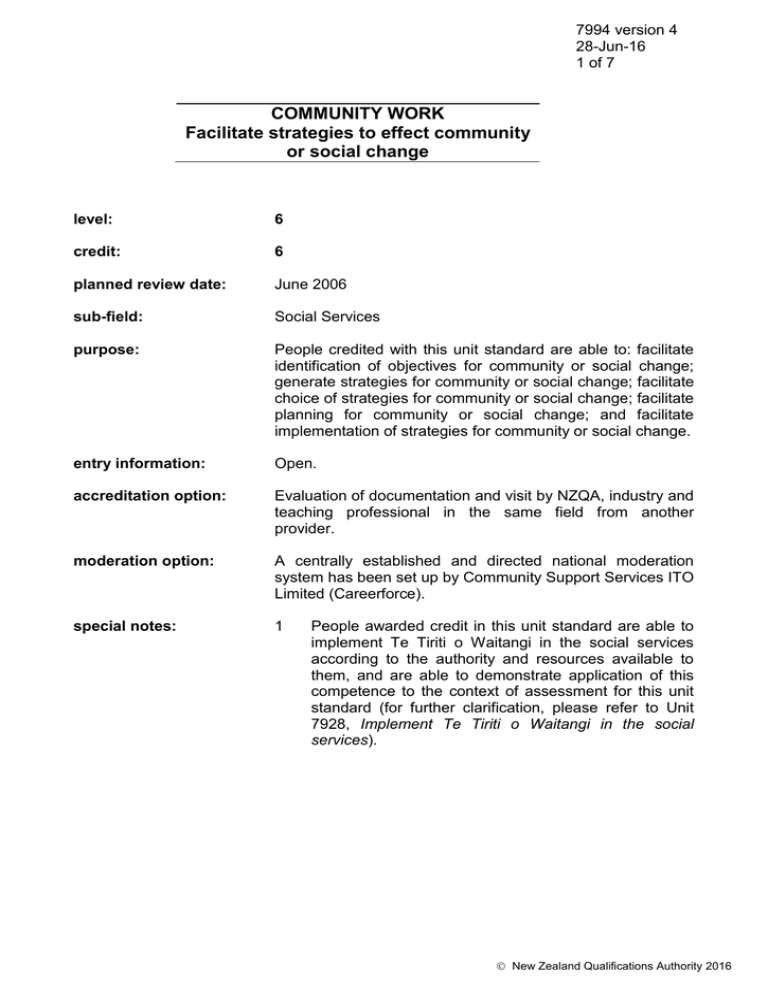
7994 version 4 28-Jun-16 1 of 7 COMMUNITY WORK Facilitate strategies to effect community or social change level: 6 credit: 6 planned review date: June 2006 sub-field: Social Services purpose: People credited with this unit standard are able to: facilitate identification of objectives for community or social change; generate strategies for community or social change; facilitate choice of strategies for community or social change; facilitate planning for community or social change; and facilitate implementation of strategies for community or social change. entry information: Open. accreditation option: Evaluation of documentation and visit by NZQA, industry and teaching professional in the same field from another provider. moderation option: A centrally established and directed national moderation system has been set up by Community Support Services ITO Limited (Careerforce). special notes: 1 People awarded credit in this unit standard are able to implement Te Tiriti o Waitangi in the social services according to the authority and resources available to them, and are able to demonstrate application of this competence to the context of assessment for this unit standard (for further clarification, please refer to Unit 7928, Implement Te Tiriti o Waitangi in the social services). New Zealand Qualifications Authority 2016 7994 version 4 28-Jun-16 2 of 7 COMMUNITY WORK Facilitate strategies to effect community or social change 2 Glossary Community may include but is not limited to: a community of interest, a community of locality, a cultural community, a kin group. People awarded credit for this unit standard demonstrate competence in one context. Concerns, issues, or needs may be cultural, economic, educational, emotional, psychological, physical, spiritual, social, structural, or political, or related to age, gender, or sexual orientation. People awarded credit for this unit standard demonstrate competence in one context, with any combination of the above factors. Facilitation method(s) may include but are not limited to: group discussion, hui, individual dialogue, oral and written presentation, seminar, workshop. Facilitation role(s) may include but are not limited to: educator, enabler, facilitator, leader, presenter, researcher. Identified concerns, issues, or needs may include but are not limited to: alternative care, community issues, criminal justice, disabilities, economic development, employment, environmental issues, families and whānau, health care, housing and land, human rights, iwi development, legal issues, planning, poverty, psychiatric care, recreation, safety, sexuality, social crisis and change, social policy and services, social structures, alcohol and drug issues, Te Tiriti o Waitangi relationships. Key people may include but are not limited to people within a family or whānau, hapū, iwi, group, agency, or organisation who are given the authority or mana to speak on behalf of those people by virtue of their position, expertise, or knowledge. Where a community of locality is the focus, key people include those identified from a cross section of individuals and organisations that provide services to the community of locality. New Zealand Qualifications Authority 2016 7994 version 4 28-Jun-16 3 of 7 COMMUNITY WORK Facilitate strategies to effect community or social change Nature of the participants is determined by reference to factors that may include but are not limited to the age and stage of development, cultures, developmental needs, disabilities, gender, goals, health status, interests, kin relationships, language, sexual orientation, and/or socio-economic status of the members of the group or community. People awarded credit for this unit standard demonstrate competence in one context, with any combination of the above factors. Social policies include policies of social service agencies or organisations, and central or local government, and "include all those things deliberately done [.] to promote wellbeing and to limit the effects of misfortune, primarily in terms of material advantages and disadvantages." Acknowledgements to Oliver, W.H. April 1988. "Social Policy in New Zealand: An Historical Overview". In: The April Report: Volume 1: New Zealand Today: Report of the Royal Commission on Social Policy (Te Komihana A Te Karauna Mo Nga Ahuatanga-A-Iwi). Wellington: The Royal Commission on Social Policy: p 3. Structures may include but are not limited to: cultural, economic, ideological, and kin structures; political and social agencies and organisations; other arrangements that distribute or process resources or maintain, manage, govern, or organise society. 3 Sources of criteria established by legislation, ethical practice, and service provider guidelines may include but are not limited to: Official Information Act 1982, Privacy Act 1993, service provider codes of conduct, codes of practice issued by the Privacy Commissioner, social service codes of ethics, and service provider guidelines, protocols, staff manuals, strategic plans, kawa, or tikanga. New Zealand Qualifications Authority 2016 7994 version 4 28-Jun-16 4 of 7 COMMUNITY WORK Facilitate strategies to effect community or social change 4 People awarded credit in this unit standard show that their actions are guided and supported by valid theory for social service practice. Evidence is required of social service theory that is derived from authoritative sources, which may include but are not limited to: body of knowledge related to social service work; cultural theory; practice research. Elements and Performance Criteria element 1 Facilitate identification of objectives for community or social change. performance criteria 1.1 Facilitation is through role(s) and method(s) that match the nature of the participants. 1.2 Facilitation enables identification of objectives for community or social change in terms of the outcomes of analysis of identified concerns, issues, or needs. 1.3 Facilitation enables identification of objectives according to actual or predicted positive and negative impacts of identified concerns, issues, or needs on participants. 1.4 The analysis and objectives are confirmed with key people. element 2 Generate strategies for community or social change. performance criteria 2.1 Facilitation role(s) and method(s) used to generate strategies match the nature of the participants. 2.2 Facilitation generates strategies in terms of their potential to enable the participants to achieve established objectives. New Zealand Qualifications Authority 2016 7994 version 4 28-Jun-16 5 of 7 COMMUNITY WORK Facilitate strategies to effect community or social change element 3 Facilitate choice of strategies for community or social change. performance criteria 3.1 Role(s) and method(s) used to facilitate choice of strategies match the nature of the participants. 3.2 Facilitation enables the evaluation of strategies according to their potential to achieve the objectives of the participants. 3.3 Facilitation enables the evaluation of strategies in terms of the resources that are available to implement those strategies. Range: 3.4 resources may include but are not limited to - accommodation, alliances for change, cultural expertise, educational resources, finance, financial advice or services, legal advice or services, food, grants, people, technological resources, time, transport, oral resources, written resources. Facilitation enables the selection of strategies within parameters established by the participants. Range: parameters may include but are not limited to - culture, values, and experience of the participants; culture, values, and experience of the people with whom they form alliances; culture, values, and experience of the people who will implement the strategies; potential for effectiveness in achieving objectives; available resources. element 4 Facilitate planning for community or social change. performance criteria 4.1 Role(s) and method(s) used to facilitate planning match the nature of the participants. New Zealand Qualifications Authority 2016 7994 version 4 28-Jun-16 6 of 7 COMMUNITY WORK Facilitate strategies to effect community or social change 4.2 Facilitation enables design of a plan for community or social change that covers essential factors. Range: essential factors may include but are not limited to - objectives, resources that are available to meet objectives, time frame consistent with the use of available resources to achieve objectives, responsibilities and accountabilities of people who will be involved in implementing the plan, contingencies, procedures to be followed in relation to contingencies, methods for evaluating progress towards achieving the objectives. element 5 Facilitate implementation of strategies for community or social change. performance criteria 5.1 Role(s) and method(s) used to facilitate implementation match the nature of the participants and the people implementing the strategies. 5.2 Facilitation enables implementation of strategies in accordance with the plan. 5.3 Facilitation enables evaluation of strategies using methods that measure outcomes against the objectives and goals of the participants. 5.4 Where necessary, strategies are revised according to the outcomes of the evaluation. New Zealand Qualifications Authority 2016 7994 version 4 28-Jun-16 7 of 7 COMMUNITY WORK Facilitate strategies to effect community or social change Comments to: Careerforce PO Box 2637 Wellington 6140 Please Note: Providers must be accredited by the Qualifications Authority before they can offer programmes of education and training assessed against unit standards. Accredited providers assessing against unit standards must engage with the moderation system that applies to those unit standards. [Please refer to relevant Plan ref: 0222] New Zealand Qualifications Authority 2016
